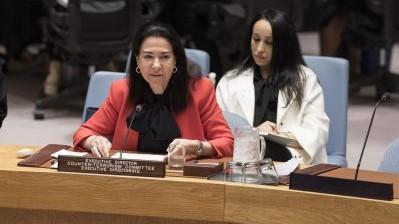
On 9 July 2019, the Security Council held an open debate on the linkages between international terrorism and organized crime. The speakers discussed ways to strengthen state capacity as well as counter-terrorism efforts at all levels. Aside from the participation of the Security Council members, there were delegates from other states and representatives from UN agencies such as the United Nations Office on Drugs and Crime (UNODC), the United Nations Interregional Crime and Justice Research Institute (UNICRI) and the United Nations Counter-Terrorism Committee Executive Directorate (CTED).
Ms. Tama Makarenko, an international consultant, participated on behalf of UNICRI. Ms. Makarenko highlighted the growing threat that these linkages pose since it has become more challenging to differentiate between a terrorist organization and a criminal group since most of the time, they share the same spaces. Ms. Makareno also highlighted the increasing focus that smaller terrorist cells are giving to prisons, as they can serve as incubators of terrorism and organized crime. Similarly, Mr. Yuri Fedetov, Executive Director of UNODC, explained how Dae’sh and Al-Shabbab profit from different criminal actors. The former has profited from illegal trade of oil and kidnapping for ransom, and the latter has profited from piracy and natural resources exploitation.
Assistant Secretary-General and Executive Director of CTED Michèle Coninsx, highlighted the many efforts of the Security Council to combat terrorism financing by adopting resolution 1373 (2001), 2195 (2014) and 2462 (2019). Furthermore, ASG Coninsx emphasized CTED’s country assessment visits that allow CTED to engage with national authorities and to share their experiences and point of views on the links between terrorism and organized crime. In addition to these country visits, CTED has participated in a number of international workshops, conferences and expert meetings with key actors such as the Council of Europe,the Global Counterterrorism Forum (GCTF), the Organization for Security and Co-operation in Europe (OSCE), the Eurasian Group (EAG) and the Asia/Pacific Group (APG) in order to discuss this growing threat. Despite CTED’s efforts, ASG Coninsx expressed her concern regarding the lack of connection between the level of concern expressed by policymakers, the implementation of legal frameworks addressing both terrorism and organized crime and the actual level of investigation and prosecution of cases involving terrorism and organized crime. Hence, Ms. Coninsx underscored the importance of intensifying efforts in diverse areas to better understand this link and to address this problem in a more effective way. Among the areas that ASG Coninsx mentioned is financial intelligence, which she stated: “financial intelligence units play a central role in States’ anti-money-laundering and counter-financing of terrorism efforts but remain generally under-used in the context of counter-terrorism.” Moreover, in line with Ms. Makarenko’s presentation, Ms. Coninsx explained the importance of addressing prison settings and environments, since in these places “there is an increasing possibility of radicalization and of the development of connections that will enable terrorists to gain access to criminal networks.” ASG Coninsx reaffirmed CTED’s commitment to combatting all forms of support for terrorist groups and individuals and the promotion and development of relevant tools and practices.

